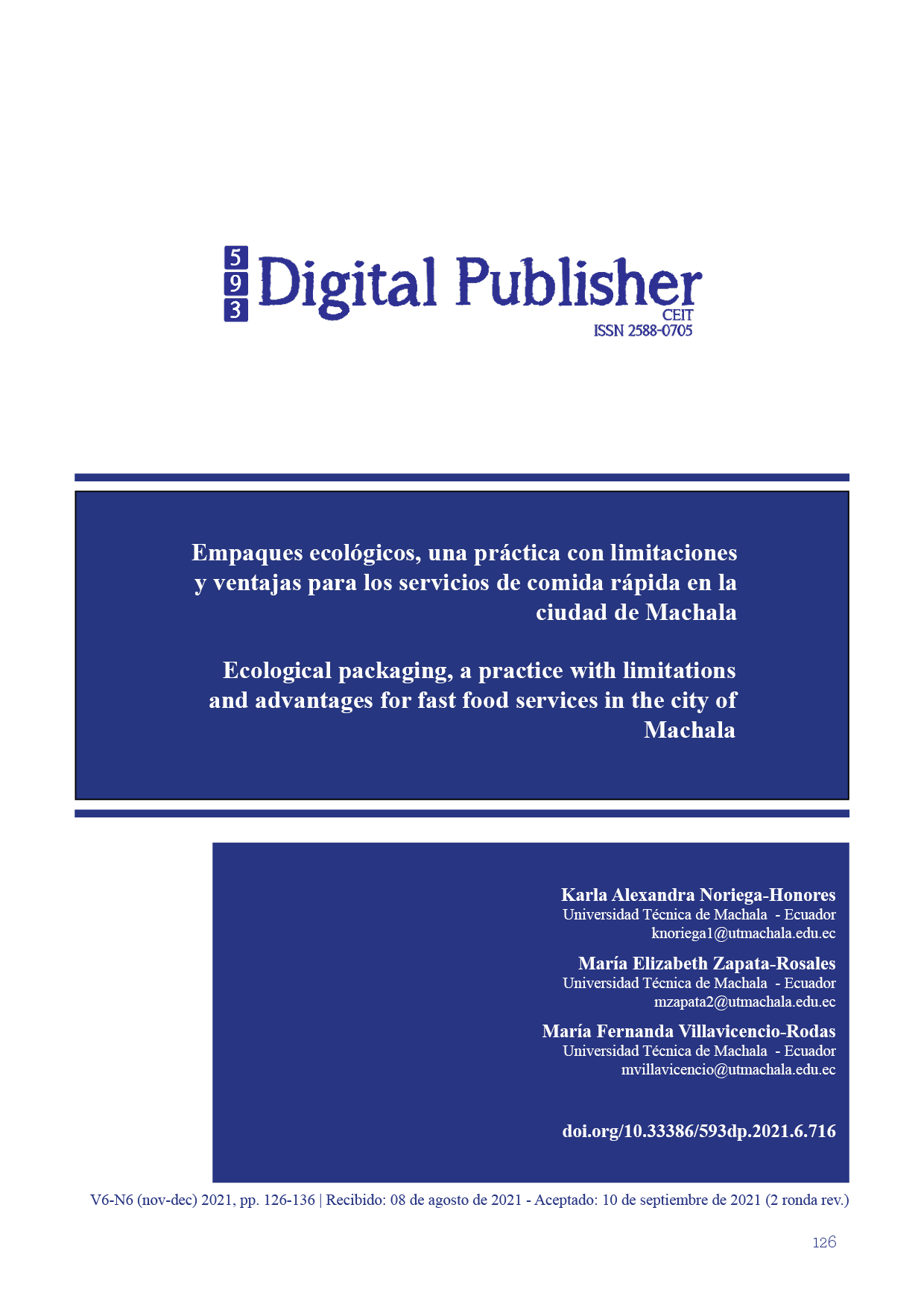Empaques ecológicos, una práctica con limitaciones y ventajas para los servicios de comida rápida en la ciudad de Machala
Contenido principal del artículo
Resumen
La presente investigación tuvo como objetivo explorar el aumento del uso de contenedores plásticos en las empresas de comida rápida de la ciudad de Machala, motivado por la alta demanda de entregas a domicilio durante la pandemia del COVID-19; además, conocer la predisposición de las empresas entrevistadas, para utilizar en sus entregas contenedores amigables con el medio ambiente, sus posibles ventajas y limitaciones en la aplicación de esta práctica en un contexto local. La metodología aplicada fue de carácter cualitativo, donde se recolectó información mediante entrevistas aplicadas a los gerentes de 10 establecimientos. Entre los resultados obtenidos, se destaca un considerable aumento en el uso de contenedores plásticos en el servicio de delivery y la existencia de barreras para los servicios de comida rápida. Por lo tanto, se concluye que entre las ventajas está la predisposición por parte de los consumidores en comprar productos en contenedores ecológicos y que los gerentes la consideran como ventaja competitiva la implementación de los mismos; mientras que como desventajas se encuentran la seguridad del viaje, el precio, el desconocimiento de proveedores y la falta de disposición de los consumidores a pagar más por contenedores eco amigables.
Descargas
Detalles del artículo

Esta obra está bajo una licencia internacional Creative Commons Atribución-NoComercial-CompartirIgual 4.0.
1. Derechos de autor
Las obras que se publican en 593 Digital Publisher CEIT están sujetas a los siguientes términos:
1.1. 593 Digital Publisher CEIT, conserva los derechos patrimoniales (copyright) de las obras publicadas, favorece y permite la reutilización de las mismas bajo la licencia Licencia Creative Commons 4.0 de Reconocimiento-NoComercial-CompartirIgual 4.0, por lo cual se pueden copiar, usar, difundir, transmitir y exponer públicamente, siempre que:
1.1.a. Se cite la autoría y fuente original de su publicación (revista, editorial, URL).
1.1.b. No se usen para fines comerciales u onerosos.
1.1.c. Se mencione la existencia y especificaciones de esta licencia de uso.
Citas
Alarcón, I. (17 de Octubre de 2020). El uso debolsas plásticas aumentó por la pandemia.El Comercio. Obtenido de elcomercio.com/tendencias/bolsas-plasticasaumento-pandemia-coronavirus.html
Alianza Basura Cero Ecuador. (2020). AlianzaBasura Cero Ecuador. Obtenido deAlianza Basura Cero Ecuador: https://www.alianzabasuraceroecuador.com/
Cadena, P., Rendón, R., Aguilar, J., Salinas,E., De la Cruz, F., & Sangerman, D.(2017). Métodos cuantitativos, métodoscualitativos o su combinación en lainvestigación: un acercamiento en las ciencias sociales. Revista mexicana de ciencias agrícolas. Obtenido de http://www. scielo.org.mx/scielo.php?script=sci_arttext&pid=S2007-09342017000701603
Chertkovskaya, E., Holmberg, K., Petersén, M.,Stripple, & Ullström, S. (2020). Makingvisible, rendering obscure: reading the plastic crisis through contemporary artistic visual representations. Global Sustainability, 3, 1-12. doi:http://doi. org/10.1017/sus.2020.10
Chun, S.-H., & Nyam-Ochir, A. (2020). The Effects of Fast Food Restaurant Attributes on Customer Satisfaction, Revisit Intention, and Recommendation Using DINESERV Scale. Sustainability, 12.doi:https://doi.org/10.3390/su12187435
Conte Grand, M., & D´Elisa, V. (2018). V6-N6 (nov-dec)/2021 134 Empaques ecológicos, una práctica con limitaciones y ventajas para los servicios de comida rápida en la ciudad de Machala | doi.org/10.33386/593dp.2021.6.716 Sustainable Development and “Green” Concepts. Revista Problemas del Desarrollo, 49(192), 61-84. Obtenido de http://www.scielo.org.mx/scielo. php?script=sci_arttext&pid=S0301- 70362018000100061&lng=es&tlng=es
Ekos. (27 de Diciembre de 2019). Zoom al sector: cartón y papel. Zoom al sector: cartón y papel. Recuperado el 02 de Agosto de 2021, de https://www.ekosnegocios.com/ articulo/zoom-al-sector-carton-y-papel
Ekos. (14 de Junio de 2021). 53% de las empresas familiares de Ecuador tuvieron una disminución en las ganancias. 53% de las empresas familiares de Ecuador tuvieron una disminución en las ganancias. Recuperado el 04 de Agosto de 2021, de https://www.ekosnegocios.com/ articulo/53-de-las-empresas-familiaresde-ecuador-tuvieron-una-disminucion-enlas-ganancias
Ekos. (17 de Junio de 2021). Gastronomía sostenible: ¿Cómo cuidar el planeta y generar un consumo más consciente desde la cocina? Gastronomía sostenible: ¿Cómo cuidar el planeta y generar un consumo más consciente desde la cocina? Recuperado el 04 de Agosto de 2021, de https://www.ekosnegocios.com/articulo/ gastronomia-sostenible-como-cuidarel-planeta-y-generar-un-consumo-masconsciente-desde-la-cocina
Espejel, A., & Castillo, I. (2019). Educación ambiental en el bachillerato: De la escuela a la familia. ALTERIDAD. Revista de Educación. Obtenido de https://doi. org/10.17163/alt.v14n2.2019.07
Gallego-Schmid, A., Mendoza, J., & Azapagic, A. (2019). Environmental impacts of
takeaway food containers. Journal of Cleaner Production, 417-427. doi:https://
doi.org/10.1016/j.jclepro.2018.11.220 Gan, Y., Xu, T., Xu, N., Xu, J., & Qiao, D. (2021). How Environmental Awareness and Knowledge Affect Urban Residents’ Willingness to Participate in Rubber Plantation Ecological Restoration Programs: Evidence from Hainan, China. Sustainability. doi:https://doi. org/10.3390/su13041852
Gibovic, D., & Bikfalvi, A. (2021). Incentives for Plastic Recycling: How to Engage Citizens
in Active Collection. Empirical Evidence from Spain. Recycling, 2(6). doi:https://
doi.org/10.3390/recycling6020029 González Ordaz, G. I., & Vargas- Hernández, J. G. (2017). La economía circular como factor de la responsabilidad social. Revista de coyuntura y perspectiva, 2(3), 105-130. Obtenido de http://www.scielo.org.bo/scielo.php?script=sci_arttext&pid=S2415-06222017000300004&lng=es&tlng=es.
Groening, C., Sarkis, J., & Zhu, Q. (2018). Green marketing consumer-level theory review: A compendium of applied theories and further research directions. Journal of Cleaner Production, 172,1848-1866. doi:https://doi.org/10.1016/j.jclepro.2017.12.002
Gustavo, J., Pereira, G., Bond, A., Viegas, C., & Borchardt, M. (2018). Drivers, opportunities and barriers for a retailer in the pursuit of more sustainable packaging redesign. Journal of Cleaner Production, 187, 18-28. doi:https://doi.org/10.1016/j. jclepro.2018.03.197
Herbes, C., Beuthner, C., & Ramme, I. (2018). packaging – A cross-cultural comparative study. Journal of Cleaner Production, 194, 203-218. doi:https://doi.org/10.1016/j.
jclepro.2018.05.106 INEC. (Diciembre de 2020). INEC. Obtenido de INEC: https://www.ecuadorencifras.gob. ec/gad-municipales/
Janairo, J.-I. (2021). Unsustainable plastic consumption associated with online food
Ecological packaging, a practice with limitations and advantages for fast food services in the city of Machala Karla Noriega-Honores | María Zapata-Rosales | María Villavicencio-Rodas | pp. 126-136 delivery services in the new normal. Cleaner and Responsible Consumption, 2. doi:https://doi.org/10.1016/j. clrc.2021.100014
Khan, A., Chen, L.-R., & Hung, C.-Y. (2021). The Role of Corporate Social Responsibility in Supporting Second-Order Social Capital and Sustainable Innovation Ambidexterity. Sustainability, 13(13). doi:https://doi.org/10.3390/su13136994 Kotler, P., & Armstrong, G. (2013). Fundamentos de Marketing (Décimoprimera ed.).
México: Pearson Educación.
Kozlowicz, K., Nazarewicz, S., Góral, D., Krawczuk, A., & Domin, M. (2019). Lyophilized Protein Structures as an Alternative Biodegradable Material for Food Packaging. Sustainability. doi:https://doi.org/10.3390/su11247002
La Hora. (26 de Octubre de 2020). Uso de plásticos
aumentan por pandemia. Uso de plásticos
aumentan por pandemia. Recuperado el 3
de Agosto de 2021, de https://lahora.com.
ec/noticia/1102331219/uso-de-plasticosaumentan-por-pandemia
Líderes. (18 de Noviembre de 2019). La
Sostenibilidad es el nuevo norte.
La Sostenibilidad es el nuevo norte.
Recuperado el 04 de Agosto de 2021,
de https://www.revistalideres.ec/lideres/
sostenibilidad-empresas-innovacionresponsabilidad-corporativa.html
Líderes. (11 de Febrero de 2020). Boga, la
empresa que impulsa el uso de bolsas
de papel. Boga, la empresa que impulsa
el uso de bolsas de papel. Recuperado
el 02 de Agosto de 2021, de https://
www.revistalideres.ec/lideres/empresaimpulsa-bolsas-papel-quito.html
Macário, V., Cruz, E., Alburquerque, L., &
Nobrega, S. (2019). MARKETING E
CONSUMO VERDE: A INFLUÊNCIA
DO GREENWASHING NA CONFIANÇA
VERDE DOS CONSUMIDORES. Revista
de Gestão Social e Ambiental, 13(2), 93-
doi:http://dx.doi.org/10.24857/rgsa.
v13i2.2038
Mattia, G., Di Leo, A., & Pratesi, C.-A. (2021).
Recognizing the Key Drivers and Industry
Implications of Sustainable Packaging
Design: A Mixed-Method Approach.
Sustainability, 13(9), 5299. doi:https://
doi.org/10.3390/su13095299
Meseguer, V., Galvez, F., Molina, V., &
Wandosell, G. (2021). The Main Research
Characteristics of the Development of
the Concept of the Circular Economy
Concept: A Global Analysis and the Future
Agenda. Frontiers in Environmental
Science, 9. doi:https://doi.org/10.3389/
fenvs.2021.704387
Mohammadhosseini, H., Alyousef, R., & Md.
Tahir, M. (2021). Towards Sustainable
Concrete Composites through Waste
Valorisation of Plastic Food Trays as LowCost Fibrous Materials. Sustainability.
doi:https://doi.org/10.3390/su13042073
Molinos, M., & Maziotis, A. (2021). The Cost
of Reducing Municipal Unsorted Solid
Waste: Evidence from Municipalities in
Chile. Sustainability, 13(12). doi:https://
doi.org/10.3390/su13126607
Nañez, S., Reier, R., Pi, O., & Vázquez, J.
(2021). Digitalization, Circular Economy
and Environmental Sustainability: The
Application of Artificial Intelligence in
the Efficient Self-Management of Waste.
Sustainability, 13(4). doi:https://doi.
org/10.3390/su13042092
Porcelei, A. M., & Martínez, A. N. (2018).
Análisis legislativo del paradigma de
la economía circular. Revista Dereito
GV, 1067-1105. doi: https://doi.
org/10.1590/2317-6172201840
Revista Líderes. (13 de Septiembre de 2019).
Los ‘envases del futuro’ ante la crisis
ambiental. Revista Líderes. Obtenido
de https://www.revistalideres.ec/lideres/
V6-N6 (nov-dec)/2021
Empaques ecológicos, una práctica con limitaciones y ventajas
para los servicios de comida rápida en la ciudad de Machala
| doi.org/10.33386/593dp.2021.6.716
envases-crisis-ambiental-reciclajeplastico.html
Reyes, A., Pellegrini, N., & Reyes, R. (2015).
El reciclaje como alternativa de manejo
de los residuos sólidos en el sector
minas de Baruta, Estado Miranda,
Venezuela. Revista de Investigación.
Obtenido de http://ve.scielo.org/scielo.
php?script=sci_arttext&pid=S1010-
&lng=es&tlng=es.
Rupprecht, C. D., Vervoort, J., Berthelsen, C.,
Mangnus, A., Osberne, N., Thompson,
K., . . . McGreevy. (2020). Multispecies
sustainability. Global Sustainability, 3.
doi:https://doi.org/10.1017/sus.2020.28
Salas, H. (2018). Marketing ecológico: La
creciente preocupación empresarial por
la protección del medio ambiente. Fides
et Ratio - Revista de Difusión cultural y
científica de la Universidad La Salle en
Bolivia(15), 151- 169. Obtenido de http://
www.scielo.org.bo/scielo.php?script=sci_
arttext&pid=S2071-081X201800010001
&lng=es&tlng=es.
Sánchez, L., Tovar, N., Suarez, J., Bravo, J.,
& Rojas, D. (2021). Mechanical and
Market Study for Sand/Recycled-Plastic
Cobbles in a Medium-Size Colombian
City. Recycling, 6(1). doi:https://doi.
org/10.3390/recycling6010017
Sani, D., Picone, S., Bianchini, A., Fava, F.,
Guarnieri, Patricia, & Rossi, J. (2021). An
Overview of the Transition to a Circular
Economy in Emilia-Romagna Region,
Italy Considering Technological, Legal–
Regulatory and Financial Points of View:
A Case Study. Sustainability, 13(2).
doi:https://doi.org/10.3390/su13020596
Sanmartín, G., Zhigue, R., & Alaña, T. (2017).
EL RECICLAJE: UN NICHO DE
INNOVACIÓN Y EMPRENDIMIENTO
CON ENFOQUE AMBIENTALISTA.
Revista Universidad y Sociedad.
Obtenido de http://scielo.sld.cu/scielo.
php?script=sci_arttext&pid=S2218-
&lng=es&tlng=es.
Souza, C., Rodrigues, J., & Sánchez, M.
D. (2016). MOTIVACIONES PARA
ACCIONES DE RSE EN RESORTS
EN BRASIL. Revista de Estudios
Empresariales. Segunda Época(2), 32-54.
doi:10.17561/ree.v0i2.3173
Wandosell, G., Parra-Meroño, M. A., & Baños, R.
(2021). Green Packaging from Consumer
and Business Perspectives. Sustainability.
doi:https://doi.org/10.3390/su13031356
Yang, S.-P., Chang, S.-C., Liang, T.-C., Situmorang,
R.-O., & Hussain, M. (2021). Consumer
Confusion and Green Consumption
Intentions from the Perspective of FoodRelated Lifestyles on Organic Infant Milk
Formulas. Sustainability. doi:https://doi.
org/10.3390/su13041606




